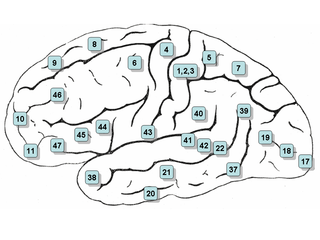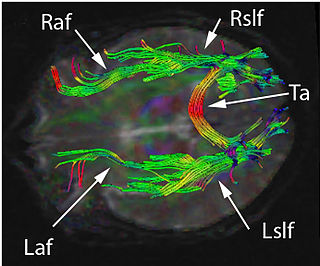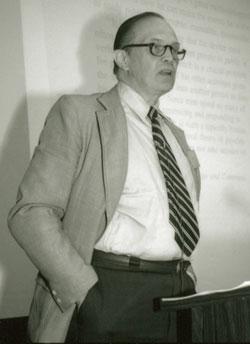Cognitive psychology is the scientific study of mental processes such as attention, language use, memory, perception, problem solving, creativity, and reasoning.

Cognition is the "mental action or process of acquiring knowledge and understanding through thought, experience, and the senses". It encompasses all aspects of intellectual functions and processes such as: perception, attention, thought, imagination, intelligence, the formation of knowledge, memory and working memory, judgment and evaluation, reasoning and computation, problem-solving and decision-making, comprehension and production of language. Cognitive processes use existing knowledge and discover new knowledge.
Psycholinguistics or psychology of language is the study of the interrelation between linguistic factors and psychological aspects. The discipline is mainly concerned with the mechanisms by which language is processed and represented in the mind and brain; that is, the psychological and neurobiological factors that enable humans to acquire, use, comprehend, and produce language.

Neurolinguistics is the study of neural mechanisms in the human brain that control the comprehension, production, and acquisition of language. As an interdisciplinary field, neurolinguistics draws methods and theories from fields such as neuroscience, linguistics, cognitive science, communication disorders and neuropsychology. Researchers are drawn to the field from a variety of backgrounds, bringing along a variety of experimental techniques as well as widely varying theoretical perspectives. Much work in neurolinguistics is informed by models in psycholinguistics and theoretical linguistics, and is focused on investigating how the brain can implement the processes that theoretical and psycholinguistics propose are necessary in producing and comprehending language. Neurolinguists study the physiological mechanisms by which the brain processes information related to language, and evaluate linguistic and psycholinguistic theories, using aphasiology, brain imaging, electrophysiology, and computer modeling.
Psychology is an academic and applied discipline involving the scientific study of human mental functions and behavior. Occasionally, in addition or opposition to employing the scientific method, it also relies on symbolic interpretation and critical analysis, although these traditions have tended to be less pronounced than in other social sciences, such as sociology. Psychologists study phenomena such as perception, cognition, emotion, personality, behavior, and interpersonal relationships. Some, especially depth psychologists, also study the unconscious mind.

Anomic aphasia is a mild, fluent type of aphasia where individuals have word retrieval failures and cannot express the words they want to say. By contrast, anomia is a deficit of expressive language, and a symptom of all forms of aphasia, but patients whose primary deficit is word retrieval are diagnosed with anomic aphasia. Individuals with aphasia who display anomia can often describe an object in detail and maybe even use hand gestures to demonstrate how the object is used, but cannot find the appropriate word to name the object. Patients with anomic aphasia have relatively preserved speech fluency, repetition, comprehension, and grammatical speech.

George Armitage Miller was an American psychologist who was one of the founders of cognitive psychology, and more broadly, of cognitive science. He also contributed to the birth of psycholinguistics. Miller wrote several books and directed the development of WordNet, an online word-linkage database usable by computer programs. He authored the paper, "The Magical Number Seven, Plus or Minus Two," in which he observed that many different experimental findings considered together reveal the presence of an average limit of seven for human short-term memory capacity. This paper is frequently cited by psychologists and in the wider culture. Miller won numerous awards, including the National Medal of Science.

Cognitive neuropsychology is a branch of cognitive psychology that aims to understand how the structure and function of the brain relates to specific psychological processes. Cognitive psychology is the science that looks at how mental processes are responsible for the cognitive abilities to store and produce new memories, produce language, recognize people and objects, as well as our ability to reason and problem solve. Cognitive neuropsychology places a particular emphasis on studying the cognitive effects of brain injury or neurological illness with a view to inferring models of normal cognitive functioning. Evidence is based on case studies of individual brain damaged patients who show deficits in brain areas and from patients who exhibit double dissociations. Double dissociations involve two patients and two tasks. One patient is impaired at one task but normal on the other, while the other patient is normal on the first task and impaired on the other. For example, patient A would be poor at reading printed words while still being normal at understanding spoken words, while the patient B would be normal at understanding written words and be poor at understanding spoken words. Scientists can interpret this information to explain how there is a single cognitive module for word comprehension. From studies like these, researchers infer that different areas of the brain are highly specialised. Cognitive neuropsychology can be distinguished from cognitive neuroscience, which is also interested in brain-damaged patients, but is particularly focused on uncovering the neural mechanisms underlying cognitive processes.
The language module or language faculty is a hypothetical structure in the human brain which is thought to contain innate capacities for language, originally posited by Noam Chomsky. There is ongoing research into brain modularity in the fields of cognitive science and neuroscience, although the current idea is much weaker than what was proposed by Chomsky and Jerry Fodor in the 1980s. In today's terminology, 'modularity' refers to specialisation: language processing is specialised in the brain to the extent that it occurs partially in different areas than other types of information processing such as visual input. The current view is, then, that language is neither compartmentalised nor based on general principles of processing. It is modular to the extent that it constitutes a specific cognitive skill or area in cognition.
Bilingualism, a subset of multilingualism, means having proficiency in two or more languages. A bilingual individual is traditionally defined as someone who understands and produces two or more languages on a regular basis. A bilingual individual's initial exposure to both languages may start in early childhood, e.g. before age 3, but exposure may also begin later in life, in monolingual or bilingual education. Equal proficiency in a bilingual individuals' languages is rarely seen as it typically varies by domain. For example, a bilingual individual may have greater proficiency for work-related terms in one language, and family-related terms in another language.
Tip of the tongue is the phenomenon of failing to retrieve a word or term from memory, combined with partial recall and the feeling that retrieval is imminent. The phenomenon's name comes from the saying, "It's on the tip of my tongue." The tip of the tongue phenomenon reveals that lexical access occurs in stages.
In linguistics, lexicalization is the process of adding words, set phrases, or word patterns to a language's lexicon.
Deep dyslexia is a form of dyslexia that disrupts reading processes. Deep dyslexia may occur as a result of a head injury, stroke, disease, or operation. This injury results in the occurrence of semantic errors during reading and the impairment of nonword reading.
Eleanor M. Saffran, an American neuroscientist, was a researcher in the field of Cognitive Neuropsychology. Her interest in Neuropsychology began at the Baltimore City hospitals of Johns Hopkins University, where her research unit focused on neurological patients with language or cognitive impairments. In papers published between 1976 and 1982, Dr. Saffran spelled out the methodological tenets of “cognitive neuropsychology” exemplified in her studies of aphasia, alexia, auditory verbal agnosia, and short-term memory impairment.
Brian Lewis Butterworth FBA is emeritus professor of cognitive neuropsychology in the Institute of Cognitive Neuroscience at University College London, England. His research has ranged from speech errors and pauses, short-term memory deficits, reading and the dyslexias both in alphabetic scripts and Chinese, and mathematics and dyscalculia. He has also pioneered educational neuroscience, notably in the study of learners with special educational needs.
In psychology, a lemma is an abstract conceptual form of a word that has been mentally selected prior to the early stages of speech production. This concept is used to explain how the process of generating speech occurs. In particular, lemmas are seen as the mental representations of words that are organised and retrieved from memory before they are eventually spoken.. A lemma represents a specific meaning but does not have any specific sounds that are attached to it.
The mental lexicon is a component of the human language faculty that contains information regarding the composition of words, such as their meanings, pronunciations, and syntactic characteristics. The mental lexicon is used in linguistics and psycholinguistics to refer to individual speakers' lexical, or word, representations. However, there is some disagreement as to the utility of the mental lexicon as a scientific construct.
Viorica Marian is a Moldovan-born American psycholinguist, cognitive scientist, and psychologist known for her research on bilingualism and multilingualism. She is the Ralph and Jean Sundin Endowed Professor of Communication Sciences and Disorders, and professor of psychology at Northwestern University. Marian is the principal investigator of the Bilingualism and Psycholinguistics Research Group. She received her PhD in psychology from Cornell University, and master's degrees from Emory University and from Cornell University. Marian studies language, cognition, the brain, and the consequences of knowing more than one language for linguistic, cognitive, and neural architectures.
Randi Martin is the Elma Schneider Professor of Psychology at Rice University and Director of the T. L. L. Temple Foundation Neuroplasticity Research Laboratory. With Suparna Rajaram and Judith Kroll, Martin co-founded Women in Cognitive Science in 2001, an organization supported in part through the National Science Foundation's ADVANCE Leadership program. She is a Fellow of the American Association for the Advancement of Science (AAAS) and the Society of Experimental Psychologists (SEP).

Carlo Semenza is an Italian neuropsychologist and cognitive neuroscientist. Carlo Semenza’s research activity mostly contributed to the field of aphasiology, neuropsychology of language, and numerical cognition.






